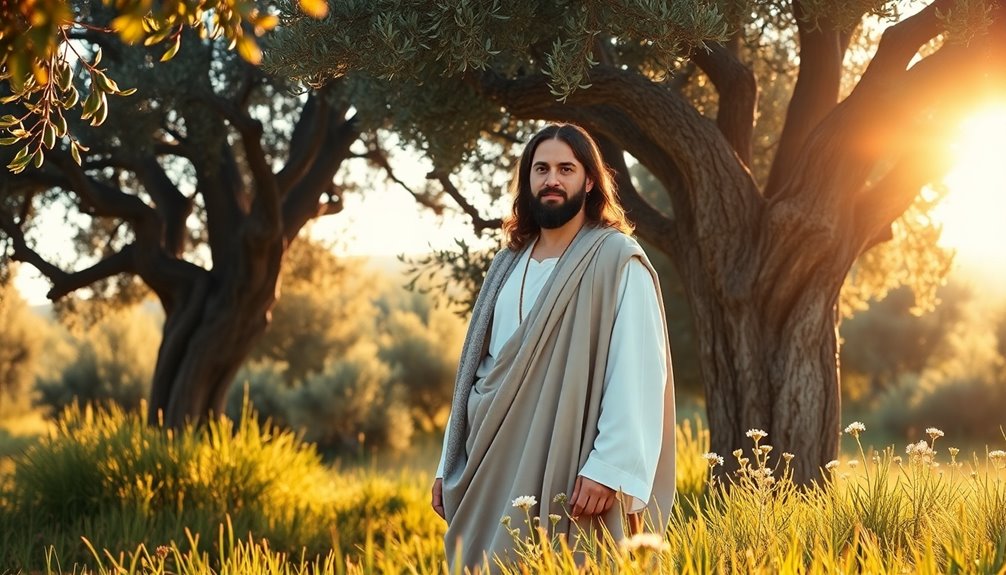The Trinity in the Bible refers to one God in three distinct Persons: the Father, the Son, and the Holy Spirit. While the term "Trinity" isn't explicitly mentioned, it's implied in key verses, such as Matthew 28:19 and 2 Corinthians 13:14. These scriptures highlight the unity and distinct roles of each Person within the Godhead. Misunderstandings often lead to viewing them as separate gods, but they are all fully God. This foundational belief shapes Christian doctrine and community life. You might find it enlightening to explore further how this understanding impacts faith and practice.
Key Takeaways
- The Trinity is implied in the Bible, notably in Matthew 28:19, which commands baptism in the name of the Father, Son, and Holy Spirit.
- Genesis 1:26 reflects God's plurality, suggesting a multi-personal nature in the act of creation.
- 2 Corinthians 13:14 includes a blessing from the Father, Son, and Holy Spirit, highlighting their distinct roles yet unified essence.
- John 14:16-17 shows the relationship between Jesus and the Holy Spirit, affirming the interconnection within the Trinity.
- Colossians 2:9 states that the fullness of God dwells in Christ, underscoring the divinity of the Son within the Trinity.
Introduction

The concept of the Trinity is a fundamental aspect of Christian belief, and it's essential to understand how it shapes the faith. At its core, the Trinity reveals that God exists as three distinct Persons: the Father, the Son, and the Holy Spirit, yet remains one God. This profound mystery is foundational to Christian theology, influencing how you view creation, salvation, and the relational nature of God.
While the term "Trinity" isn't explicitly found in the Bible, verses like Matthew 28:19 and 2 Corinthians 13:14 suggest the triune nature of God. Key passages such as Genesis 1:26 and Isaiah 6:8 imply a plurality in God's nature, indicating the presence of multiple Persons within the one Godhead.
You can see the distinct roles of the Trinity highlighted in the New Testament, particularly during Jesus' baptism in Matthew 3:16-17, where all three Persons are present and active.
Understanding the Trinity isn't just an intellectual exercise; it's crucial for grasping core Christian doctrines. It deepens your relationship with God and enriches your faith journey, reminding you that you engage with a complex, loving, and relational God.
Trinitarian Bible Verses

When you explore Trinitarian Bible verses, you'll find key references that highlight the distinct yet unified nature of God.
For instance, verses like Matthew 28:19 and 2 Corinthians 13:14 clearly illustrate the roles of the Father, Son, and Holy Spirit.
These scriptures offer a solid foundation for understanding the Trinity's presence throughout the Bible.
Primary Bible References
Throughout the Bible, several key verses highlight the doctrine of the Trinity, demonstrating the relationship and unity among the Father, Son, and Holy Spirit.
In Matthew 28:19, you see Jesus instructing His followers to baptize in the name of the Father, Son, and Holy Spirit, emphasizing their unified presence. This command showcases the importance of the Trinity in the life of believers.
Similarly, 2 Corinthians 13:14 presents a blessing that explicitly mentions the Father, Son, and Holy Spirit, affirming their distinct roles yet unified essence.
You also find in John 14:16-17 that Jesus promises the Holy Spirit, illustrating the dynamic relationship between the Son and the Holy Spirit in guiding believers.
Genesis 1:26 further hints at this plurality within the divine nature, as God speaks in the plural form "Us" when creating humanity.
Lastly, Colossians 2:9 states that in Christ dwells all the fullness of the Godhead bodily, confirming the full divinity of the Son within the Trinity.
These Bible verses collectively affirm the foundational belief in the triune nature of God, inviting you to deepen your understanding of this profound mystery.
Secondary Bible References
Building on the foundational verses that highlight the Trinity, several secondary references further enrich our understanding of this doctrine. In Matthew 28:19, Jesus commands us to baptize in the name of the Father, Son, and Holy Spirit, emphasizing the unity and equality of these three divine Persons in the Godhead. This verse illustrates the essential relationship among the Trinity.
2 Corinthians 13:14 provides a blessing that references all three Persons, affirming their distinct roles while underscoring their shared divinity. Similarly, John 14:26 identifies the Holy Spirit as the Helper sent by the Father in Jesus' name, showcasing the cooperation within the Trinity.
Acts 10:38 describes how the Father anointed the Son with the Holy Spirit, highlighting the unique functions of each Person in the ministry of Jesus.
Additionally, Ephesians 1:17 expresses a prayer for wisdom from the Father of glory, recognizing the unique work each Person performs within the Trinity.
Together, these secondary references not only affirm the doctrine of the Trinity but also illustrate the active participation and distinct roles of the Father, Son, and Holy Spirit in our lives.
Early Church Doctrinal Debates

The early church was a battleground of ideas as theologians grappled with the nature of God and the relationship between the Father, Son, and Holy Spirit. The term "Trinity" emerged in the late 2nd century, introduced by Theophilus of Antioch to describe this complex relationship.
Early church fathers like Justin Martyr laid important groundwork for Trinitarian theology, emphasizing Christ's divinity and the necessity of worshiping Him as the Son of God.
Tertullian later formalized the doctrine, articulating that the Trinity consists of the Father, Son, and Holy Spirit while combating heretical views like Arianism.
The First Council of Nicaea in 325 AD became a pivotal moment in these doctrinal debates, as it directly addressed the Arian controversy. The council affirmed the Nicene Creed, declaring the Son to be "true God from true God," thus establishing His divinity alongside the Father.
In the face of various theological challenges, subsequent church councils continued to clarify and defend the Trinitarian understanding.
This ongoing dialogue shaped the early church's beliefs, ensuring the foundation for the doctrine of the Trinity that many hold today.
Theological Significance of the Trinity

Understanding the theological significance of the Trinity is crucial for grasping the essence of Christian belief. The Trinity reveals that God exists as one Being in three distinct Persons: the Father, the Son, and the Holy Spirit. Each Person is fully and equally God, which is foundational to the Christian doctrine. This understanding is vital for comprehending key doctrines such as creation, salvation, and revelation, as each Person has a unique role in these divine activities.
The relationship among the Father, Son, and Holy Spirit models perfect unity and community, illustrating how Christians are called to live in fellowship and love. This unity reflects God's relational nature and informs your understanding of prayer, worship, and spiritual life.
The Great Commission in Matthew 28:19 emphasizes this significance, as Jesus commands baptism in the name of the Father, Son, and Holy Spirit, highlighting their equal authority in the life of the believer.
Ultimately, recognizing the Trinity deepens your relationship with God and enriches your faith, assuring you of His presence and guidance in your journey toward salvation. Understanding this doctrine enhances your spiritual growth and commitment to living out the Christian faith.
Misunderstanding the Trinity's Unity

When you think about the Trinity, it's easy to fall into common misconceptions that blur its true unity.
Many misinterpret Scripture, seeing the Father, Son, and Holy Spirit as separate modes rather than distinct Persons who coexist in perfect harmony.
Let's clear up these misunderstandings and explore how the Bible presents the Trinity as one essence in three divine Persons.
Debunk Common Trinitarian Misconceptions
Amidst the complexities surrounding the Trinity, many misconceptions stem from a misunderstanding of its unity. People often think of the Trinity as merely three different roles of one God, but that's not accurate. Each Person—Father, Son, and Holy Spirit—is fully God and maintains distinct identities and relationships. This biblical concept is supported in Matthew 28:19 and 2 Corinthians 13:14, where we see that all three share the same divine essence.
Some might argue that the Trinity creates a division in God's essence, yet Scripture shows that God can exist as three distinct Persons without any division in His being, as illustrated in John 10:30. The unity in essence doesn't negate individuality; instead, it highlights the relational dynamics within the Godhead.
Early church fathers like Tertullian emphasized that the term "Trinity" captures the mystery of one God in three Persons. Misconceptions often arise from oversimplified analogies and the limitations of human understanding.
Misinterpretation of Scripture
Misinterpretation of Scripture often clouds the understanding of the Trinity's unity, leading many to perceive the Father, Son, and Holy Spirit as three separate gods. This misinterpretation arises from a failure to recognize that the Trinity consists of one God in three Persons, each fully divine yet uniquely individual. Many biblical texts, such as Isaiah 45:21-22, affirm the essential monotheism that underpins this belief.
When you emphasize the distinct roles of the Father, Son, and Holy Spirit independently, you risk losing sight of their unity in essence. For instance, Matthew 28:19 illustrates this unity by instructing baptism in the singular name of all three Persons.
Modalism complicates matters further by suggesting God merely shifts between different forms, ignoring the simultaneous existence of the Trinity, as seen during Jesus' baptism (Matthew 3:16-17).
These misinterpretations can lead to the dangerous belief that the Trinity is a human-made concept. In truth, it's a divinely revealed truth supported by various biblical texts, including 2 Corinthians 13:14, which highlight both the unity and distinctiveness of the Godhead.
Understanding this is crucial for grasping the true nature of the Trinity.
Community Service Projects

As you consider ways to embody the principles of the Trinity, think about how you can serve as a Trinity Ambassador through community service projects.
These initiatives not only reflect your commitment to unity and collaboration but also address the needs of those around you.
Serve as a Trinity Ambassador
Serving as a Trinity Ambassador offers a unique opportunity to deepen your community's understanding of the triune nature of God. Through community service projects, you can organize workshops that explore the biblical basis of the doctrine of the Trinity, emphasizing the significance of God the Father, Jesus, and the Holy Spirit as three Persons in one.
These educational programs can spark engaging discussions about each Person's role in salvation and worship, fostering a deeper appreciation among participants.
You can also participate in outreach initiatives that encourage conversations with individuals who may have misconceptions about the Trinity. By collaborating with local churches and organizations, you'll enhance community involvement and promote collective learning.
Utilizing multimedia resources, like videos and literature, can effectively communicate the complexities of the Trinity, addressing common misunderstandings while promoting sound doctrine.
Ultimately, your work as a Trinity Ambassador not only enriches your understanding of the Trinity but also cultivates spiritual growth within your community.
Trinity-Themed Outreach Initiatives
Engaging in Trinity-themed outreach initiatives allows you to embody the love and unity of the Father, Son, and Holy Spirit while making a tangible difference in your community.
These projects can include organizing community meals or food drives, where you serve those in need, reflecting the diverse roles within the Trinity as you collaborate with local churches and organizations.
You might also consider hosting workshops or seminars that educate participants about the significance of the Trinity in Christian doctrine. This fosters fellowship and spiritual growth while engaging the community.
Moreover, involving youth groups in service projects emphasizes the importance of the Holy Spirit's guidance in their actions and decisions, inspiring them to live out their faith practically.
Creating a prayer campaign can further enhance these outreach initiatives, inviting community members to pray for specific needs. This highlights the interconnectedness of the Trinity in the lives of believers and those they serve.
Trinity's Role in Community Service

The Trinity serves as a profound model for community service, demonstrating how collaboration among the Father, Son, and Holy Spirit can impact the world. Each person of the Trinity contributes uniquely, guiding you in serving others with love and compassion. Jesus, as the Son, exemplifies selflessness, encouraging you to follow His example in acts of service (Mark 10:45).
The Holy Spirit plays a crucial role by empowering believers like you to engage in community service effectively. Through spiritual gifts and guidance (1 Corinthians 12:4-7), the Holy Spirit equips you to meet the needs of those around you, fostering fellowship within your community.
Participating in community service reflects the nature of the Trinity, as you manifest God's love through collective action. Working alongside fellow believers not only strengthens your bonds but also promotes harmony for the common good (Ephesians 4:3-6).
Ultimately, embracing the Trinity's model in your service helps you cultivate compassion and unity, allowing you to make a meaningful impact in your community. By embodying these principles, you can inspire others to join in this vital work of love and service.
Additional Resources

Exploring the concept of the Trinity can deepen your understanding of its implications in faith and community life. To further your exploration, consider diving into the New Testament, where you'll find significant biblical references that illustrate the roles of the three Persons: the Father, Jesus, and the Holy Spirit.
Key verses like Matthew 28:19 command baptism in the name of all three, emphasizing their unity and distinct identities. In John 14:26, Jesus describes the Holy Spirit as a Helper sent to guide believers, reinforcing the unique roles within the Trinity. Additionally, 2 Corinthians 13:14 offers a powerful blessing that includes all three Persons, showcasing how they work together in the lives of Christians.
Don't overlook the Old Testament. Genesis 1:26 hints at God's multi-personality with the plural pronoun "Us" during creation.
Early church writings, particularly from figures like Theophilus of Antioch and Tertullian, also provide valuable insights into the development of Trinitarian theology. By engaging with these resources, you'll gain a richer understanding of the Trinity and its profound impact on your faith journey.
Frequently Asked Questions
Where in the Bible Does It Explain the Trinity?
When you look for explanations of the Trinity in the Bible, you'll find key passages that highlight the distinct roles of the Father, Son, and Holy Spirit.
Matthew 28:19 discusses baptism in their names, while Genesis 1:26 hints at a multi-personal nature of God.
Additionally, John 14:16-17 shows Jesus' promise of the Holy Spirit, affirming their unity and individuality.
These verses collectively shed light on the complex relationship among the three.
Where in the Bible Does It Say God Is 3 in One?
You might find that the Bible doesn't explicitly state "God is three in one," but it does suggest this concept through various passages.
For instance, in Matthew 28:19, Jesus commands baptism in the name of the Father, Son, and Holy Spirit.
In John 14:16-17, you see the distinct roles of each Person, indicating their unity.
These verses collectively imply that God exists as a complex unity of three distinct Persons.
What Is the Simplest Way to Explain the Trinity?
The simplest way to explain the Trinity is to think of it like water, which can exist as ice, liquid, or steam—three forms, but all are still water.
Similarly, the Trinity represents one God in three distinct Persons: the Father, the Son, and the Holy Spirit. Each Person has unique roles yet shares the same divine essence, making them fully God.
It's a mystery, but it helps to grasp the concept of unity in diversity.
What Did Jesus Reveal About the Trinity?
When you explore what Jesus revealed about the Trinity, you see His unique relationship with the Father and the Holy Spirit.
He emphasized their unity and distinct roles, showing you that they work together in perfect harmony.
Through His teachings and actions, Jesus highlighted how each Person contributes to your faith and salvation.










